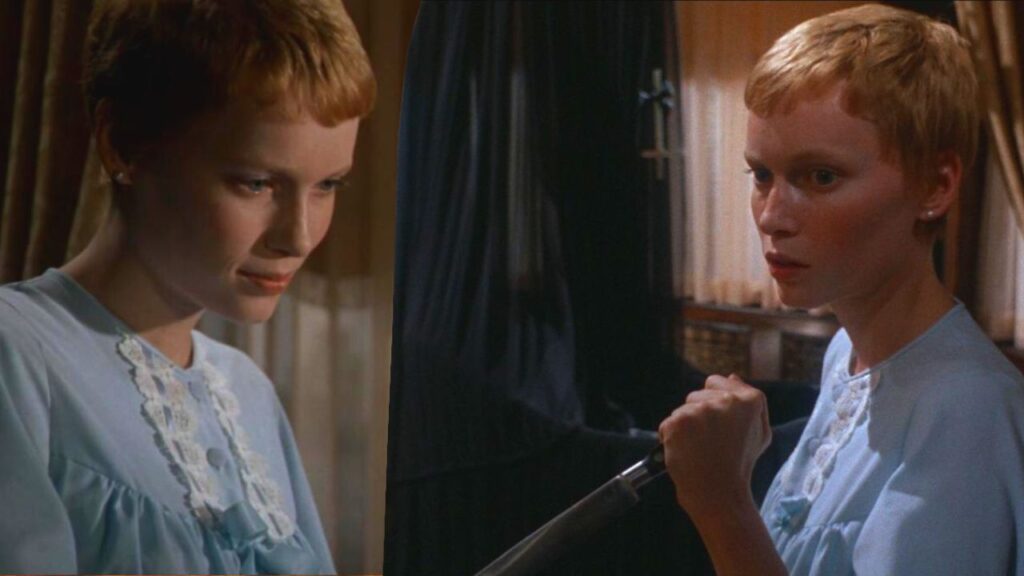This post includes a brief summary, an analysis and an explanation about the ending of “Rosemary’s Baby” (1968). Beware of spoilers.
What if your worst nightmare came true, and no one believed you? This is the chilling premise of Roman Polanski’s 1968 classic, “Rosemary’s Baby”. Starring Mia Farrow and John Cassavetes, as Rosemary Wood and Guy Wood.
“Rosemary’s Baby”‘s engaging narrative lies in its gripping plot, which takes viewers on a journey filled with paranoia and occult mysteries.
The film “Rosemary’s Baby” is about a young couple, Rosemary Wood and Guy Wood, who move into their new apartment in New York City. However, there is something sinister about their new residence. Rumour has it, the building has a long history of witchcraft. It turns out that it’s not fiction. There are Satanists in the building and they are after Rosemary!
Rosemary’s conspirators want her to carry the Devil’s seed. Therefore, they drug the young woman so the evil entity can impregnate her and they succeed. All of this is happening with Rosemary’s husband’s consent, Guy is in it too! Poor Rosemary, she goes through hell, literally, during her pregnancy. Things eventually get better for her, but not for long.
A Descent into Paranoia and Ultimate Betrayal
After a close friend’s passing, Hutch (the Satanists put a curse on him), Rosemary slowly begins to unravel the conspiracy against her. She confesses her fears to her husband, and he totally dismisses her.
When Rosemary realizes that the Satanists are after her, she locks herself inside the apartment, but to no avail, as they sneak in through a secret passage. The stressful situation causes Rosemary to go into labour.
Although the Satanists tell Rosemary that her baby is dead, she doesn’t believe them. One day, Rosemary decides to investigate further, and she finds a secret door inside her house that leads to another apartment.
The ending of “Rosemary’s Baby” shows Rosemary finding her neighbours and her husband, celebrating the birth of her baby, who is not human. Despite her disgust for the conspirators, Rosemary can’t help herself when she hears her baby cry and she starts to rock the cradle.
Delving into the enigmatic themes and unsettling finale, the analysis ahead sheds light on “Rosemary’s Baby”’s dark layers.
The film “Rosemary’s Baby” uses Rosemary’s journey and pregnancy to illustrate the loss of identity and the subsequent loss of control that many first-time mothers experience. Also, Rosemary’s conspirators’ appalling behaviour also represents misogyny against women in a modern-world context.
Historical and Cultural Context
When “Rosemary’s Baby” was released on the silver screen in 1968, that decade in particular was a significant period for women’s rights. During the 1960s, many women in the western world began to challenge traditional gender roles and fight for equal rights as well as opportunities.
The introduction of the contraceptive pill prompted a culture shift. With more control over their reproductive choices, many women saw themselves as having a completely new lifestyle. They started to enter the workforce, attend college and even delay marriage.
Misogyny
Although there were significant changes in the legislation, society as a whole still struggled to provide full gender equality. That struggle still goes on in current times. Having said that, the film portrays the complexities of being a woman in the modern world.
In the eyes of the law, Rosemary is an individual with her own rights. But in the story, all her rights were taken away without her consent. Rosemary stopped having agency over her life even before her pregnancy. Her individual freedom ended when the Satanists decided to impregnate Rosemary with the Devil’s baby.
Sometimes misogyny can be quite insidious. One of the most disturbing things about the ending of Rosemary’s Baby was the nonchalant attitude of her conspirators. Not only did they put this young woman through hell, but they also had the audacity to act as if she were the crazy one.
Acts of sexism may not always be overt, yet their impact can be profoundly damaging.
“Rosemary’s Baby” Ending: An Interpretation
The ending of “Rosemary’s Baby” portrays the weight of societal norms on Rosemary’s decision to stay. Rosemary had the option to leave, so why didn’t she? The decision was most likely a combination of nature and societal expectations.
Rosemary’s strong maternal instincts made it almost impossible for her to leave her newborn, even though he’s not human. Second, this is what society expects of women: they have to become mothers and they are supposed to take care of their offspring no matter what. Otherwise, they are deemed inept or evil.
Despite feeling wronged, betrayed and disgusted by what happened, Rosemary doesn’t know how to get out of the vicious circle. And perhaps this is the tragic conclusion of “Rosemary’s Baby”. Women will only be able to achieve greater freedom once they liberate themselves from traditional gender roles and expectations.
Final Thoughts
Rosemary’s Baby will definitely leave a bitter taste in the viewer’s mouth. Let me just say that I didn’t like the ending, she didn’t get any justice in the end. Despite not liking the ending, I must confess that it was a good one. Seeing Rosemary trapped in a vicious circle really showed how hopeless the whole situation was.
If someone asks me whether “Rosemary’s Baby” is a scary film, I would definitely say yes. However, it’s not because of the gory scenes, as a matter of fact, there is none of that. The true horror in Rosemary’s Baby is entirely psychological. From the moment Rosemary gets pregnant, she starts to gradually lose her voice. Not literally, but metaphorically speaking.
Throughout the story, nobody really cared about Rosemary’s well-being, except for Hutch. Her husband basically traded her for success. Her neighbours wanted her to have Satan’s baby. Both of Rosemary’s doctors (Dr. Hill and Dr. Sapirstein) chose to ignore their patient’s health (physical and mental). And sadly, the list of atrocities goes on.
The director of Rosemary’s Baby is the infamous Roman Polanski. Those who are acquainted with his past controversies might feel a bit hesitant about watching the film. However, as someone who likes to separate one’s work from their personal life, I must say that “Rosemary’s Baby” is a very noteworthy watch.





